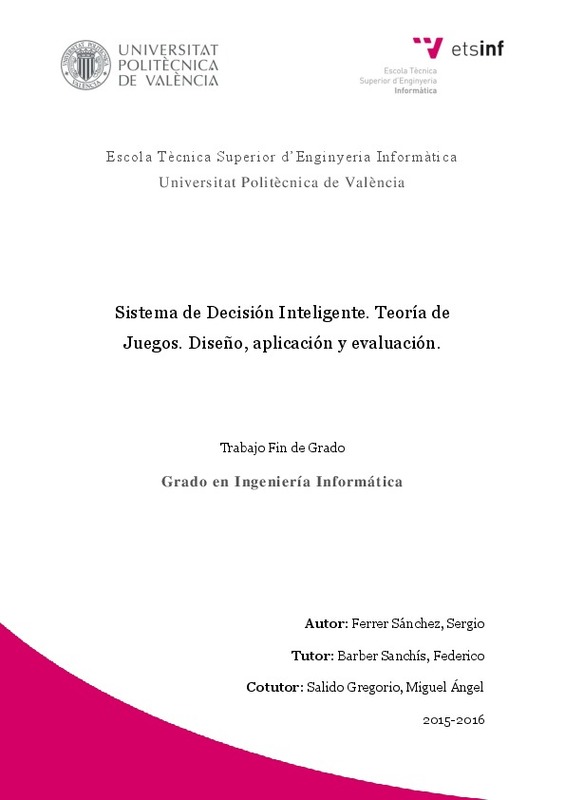JavaScript is disabled for your browser. Some features of this site may not work without it.
Buscar en RiuNet
Listar
Mi cuenta
Estadísticas
Ayuda RiuNet
Admin. UPV
Sistema de Decisión Inteligente. Teoría de Juegos. Diseño, aplicación y evaluación
Mostrar el registro sencillo del ítem
Ficheros en el ítem
| dc.contributor.advisor | Barber Sanchís, Federico
|
es_ES |
| dc.contributor.advisor | Salido Gregorio, Miguel Angel
|
es_ES |
| dc.contributor.author | Ferrer Sánchez, Sergio
|
es_ES |
| dc.date.accessioned | 2016-09-02T09:14:09Z | |
| dc.date.available | 2016-09-02T09:14:09Z | |
| dc.date.created | 2016-07-14 | |
| dc.date.issued | 2016-09-02 | es_ES |
| dc.identifier.uri | http://hdl.handle.net/10251/68600 | |
| dc.description.abstract | [ES] En este proyecto se plantea el diseño, desarrollo e implementación de un sistema capaz de resolver el ampliamente conocido problema de asignación de turnos de forma genérica, adaptable y en tiempos computacionalmente tratables con el fin de poder aplicarlo en distintos entornos y ajustándose a las necesidades concretas de cada posible escenario. El sistema desarrollado permite considerar diversos tipos de turnos, restricciones generales y específicas de asignación, y diversos criterios de optimización. Dado el alto coste computacional y las complejidades espacial y temporal a las que nos enfrentamos en la resolución de este problema característico de entornos empresariales con amplias plantillas, se plantea una solución mediante técnicas de inteligencia artificial. El método computacional desarrollado, basado en técnicas heurísticas y metaheurísticas, permite converger y obtener soluciones razonablemente optimizadas en un tiempo aceptable sin necesidad de explorar todo el espacio de búsqueda. | es_ES |
| dc.description.abstract | [EN] In this project, we propose the design and implementation of a system able to solve the well known staff rostering problem in a generic and adaptable way and fitting computationally tractable times, in order to being able to adapt it in different environments and matching the different needs of any entity that use this system. The developed system is able to work with different types of turns, general and specific constraints and multiple optimization criteria. Due to the high computational costs and to the spatial and time complexity that we have to deal with in the resolution of this distinctive problem of business environments with huge amount of staff, we expose a solution based on Artificial Intelligence techniques, specifically, guided searches and heuristics that converge in a reasonable time without exploring the complete search space. | es_ES |
| dc.format.extent | 75 | es_ES |
| dc.language | Español | es_ES |
| dc.publisher | Universitat Politècnica de València | es_ES |
| dc.rights | Reserva de todos los derechos | es_ES |
| dc.subject | Asignación de turnos | es_ES |
| dc.subject | Python | es_ES |
| dc.subject | JavaFX | es_ES |
| dc.subject | SQLite | es_ES |
| dc.subject | Búsqueda guiada | es_ES |
| dc.subject | Staff rostering problem | es_ES |
| dc.subject | Guided search | es_ES |
| dc.subject.classification | LENGUAJES Y SISTEMAS INFORMATICOS | es_ES |
| dc.subject.other | Grado en Ingeniería Informática-Grau en Enginyeria Informàtica | es_ES |
| dc.title | Sistema de Decisión Inteligente. Teoría de Juegos. Diseño, aplicación y evaluación | es_ES |
| dc.type | Proyecto/Trabajo fin de carrera/grado | es_ES |
| dc.rights.accessRights | Abierto | es_ES |
| dc.contributor.affiliation | Universitat Politècnica de València. Departamento de Sistemas Informáticos y Computación - Departament de Sistemes Informàtics i Computació | es_ES |
| dc.contributor.affiliation | Universitat Politècnica de València. Escola Tècnica Superior d'Enginyeria Informàtica | es_ES |
| dc.description.bibliographicCitation | Ferrer Sánchez, S. (2016). Sistema de Decisión Inteligente. Teoría de Juegos. Diseño, aplicación y evaluación. http://hdl.handle.net/10251/68600. | es_ES |
| dc.description.accrualMethod | TFGM | es_ES |
| dc.relation.pasarela | TFGM\33902 | es_ES |
Este ítem aparece en la(s) siguiente(s) colección(ones)
-
ETSINF - Trabajos académicos [5160]
Escola Tècnica Superior d'Enginyeria Informàtica






